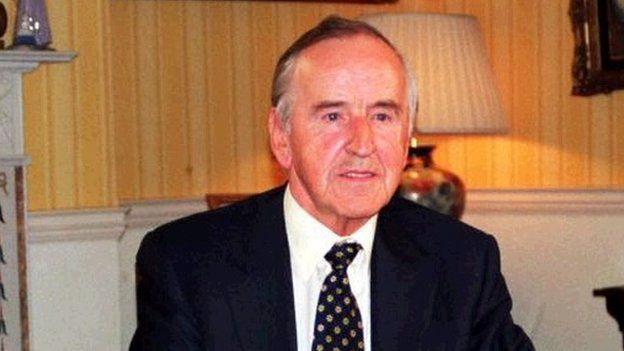Obituary: Albert Reynolds
- Published

Albert Reynolds was a self-made businessman who rose to become Ireland's eighth prime minister, or taoiseach.
He played a key role in advancing the peace process in Northern Ireland, including the 1994 IRA ceasefire
But he was forced to resign when his coalition allies pulled out of government during a row over a controversial political appointment.
Albert Reynolds was born on 3 November 1932 in Rooskey, County Roscommon, where his father worked as a coach builder.
Even in later life, he never shook off his country roots, being labelled a "bumpkin" by his political opponents.
His business acumen revealed itself at an early age when he bought and sold sweets at a profit while at primary school.
He was educated at Summerhill College, Sligo, and though he did well academically, his parents couldn't afford to send him to university, so he embarked on a business career instead.
He began as a clerk in CIE, the state transport service. During this time, he met his wife Kathleen and they were to have seven children.
In the late 1950s, he and his brother started a chain of dance halls which proved popular with thousands of teenagers throughout Ireland.
Once the showband craze was over, Reynolds ran a bacon factory, a fish export business and a pet food manufacturing company. He also had interests in local newspapers and a cinema.
By the time he entered politics at the age of 44, Albert Reynolds was a millionaire.
He became a member of the Dail for the Fianna Fáil party at the 1977 general election. By 1979 he was campaigning for Charles Haughey to take over his party's leadership.
His support was rewarded when, after Haughey became taoiseach, Reynolds was made minister for post and telegraphs and later minister for transport.
Reynolds remained a Haughey loyalist in successive governments and, in 1987, was appointed minister for industry and commerce, one of the cabinet's most senior positions, key to aiding Ireland's economic recovery.
The following year, he succeeded Ray MacSharry as finance minister.
When disillusionment with Charles Haughey's leadership began soon afterwards, Reynolds and his supporters in the Fianna Fail party, known as the Country and Western wing, supported a no-confidence motion against him.
When it was lost, Reynolds was sacked and his political career seemed over.
But as Charles Haughey's leadership ended amid a welter of political scandals, Reynolds succeeded him in the ensuing leadership election.
He made his mark as taoiseach straight away by sacking all the Haughey loyalists with the exception of Bertie Ahern.
His two-year term did not get off to a good start.
His government suffered an embarrassing defeat on the third strand of a referendum on abortion which would make the practice illegal except when the life of the mother was in danger.
Reynolds was also severely criticised in an inquiry for his role in an export credit scheme undertaken when he was Haughey's minister for industry and commerce.
The fallout from this caused a loss of confidence in him by his coalition partners that would eventually lead to his downfall.
However, during his tenure he successfully aided the peace process in Northern Ireland, co-operating in an almost unprecedented way with a British prime minister in John Major.
In particular, Albert Reynolds, with a mixture of carrot and stick, was instrumental in persuading republicans to end their commitment to violent struggle and to agree to peace negotiations with other Northern Ireland political groupings.
He said at the time: "The IRA have nowhere to go. I've stripped away all their excuses, one by one."
Reynolds did much to convince John Major that Sinn Fein's change of policy was sincere, and he helped bring the US administration on board.
Reynolds gambled that a process of inclusive negotiations, based on democratic principles, would lead to an agreed and peaceful Northern Ireland.
In December 1993, the joint Downing Street Declaration was signed and became one of the first steps towards peace in the province.
His coalition government with the Labour Party collapsed over an affair involving the Attorney-General, Harry Whelehan.
Whelehan had been severely criticised for failing to prosecute a Catholic priest who had been accused of sexually abusing children.
When Reynolds proposed to nominate Whelehan as President of the High Court his Labour coalition partners withdrew their support of the government.
Reynolds, who had also failed to get the backing of the Irish President, Mary Robinson, resigned as taoiseach but remained a member of the Dail.
In 1997 he sought Fianna Fáil's nomination as candidate for the Irish presidency. Although he won the first round, he eventually lost out to Mary McAleese, who had secured the backing of Reynolds' former ministerial colleagues.
Many of them had never forgiven him for removing them from office when he became taoiseach in 1992
Reynolds retired from politics in 2002 and took up various business directorships as well as following his main interest, horse racing.
He was a regular feature at Irish racecourses where, despite being non-smoking and non-drinking, he would as often as not be the last to leave the bar.
In his later years, he had Alzheimer's disease, which prevented him from attending the 20th anniversary commemoration of the Downing Street Declaration, probably his finest political achievement.